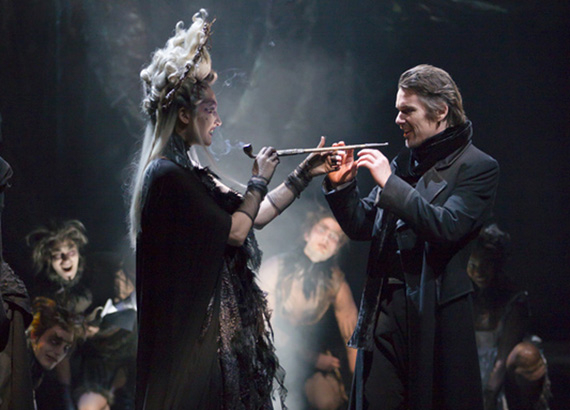Macbeth

(© T. Charles Erickson)
The Hollywood consensus is that there’s no surer way to make your film appear “epic” than to include a Magical Aryan Queen in the mix. I’m talking about those tall, icy, ethereal white women with killer costumes and a lot of attitude. Cate Blanchett as Galadriel, Tilda Swinton as the White Witch, and Charlize Theron in Snow White and the Huntsman: These are the vanguard of an archetype that has staying power, as evidenced by its determination to conquer the stage, most recently in Lincoln Center Theater‘s glossy and cinematic production of William Shakespeare’s Macbeth.
Truly, is there any English playwright more epic than the Bard of Avon? The canon of the dark prince of wordsmithery, who writes plays “jumping o’er times, turning the accomplishment of many years into an hour-glass,” is just begging for the Magical Aryan Queen (MAQ) treatment, right? One-upping Julie Taymor’s recent MAQ’d-out A Midsummer Night’s Dream, Jack O’Brien proves to be the MAQ daddy with his nightmarish production of Macbeth, which casts Hecate as the star of the show.
Who?, you might ask. Hecate is an ancient Greek goddess associated with magic and witchcraft. She appears briefly in Act III, scene V of Macbeth, to deliver a monologue expressing her displeasure with being excluded from the witches’ earlier machinations, and then basically disappears two scenes later. This monologue is often used as an entr’acte in modern productions (so that stragglers from the bathroom won’t miss anything significant), if used at all. Hecate has long been suspected of being an unnecessary and inauthentic inclusion, a part of the play so that Elizabethan audiences would have more witchy-poo song-time.
Clearly, O’Brien feels that this character is much more than that, so much that he has included Hecate in a host of scenes in which she was not originally written. Francesca Faridany plays this chief magician with staid patrician frostiness. She’s the Queen of the Witches, a MAQ of incredible power and inscrutable motivation who glides around the stage waving her magical hands. With her hair suspended high above her head by a tiny garden trellis, Hecate revels in orchestrating murders and stealing the witches’ best lines. She’s the puppeteer pulling the strings on these foolish mortals. Everything is part of her game. The plot is predestined.
Macbeth is Shakespeare’s classic story of ambition on a collision course with fate. At the start of the play, Macbeth (Ethan Hawke, illuminating the text with a clear and crisp diction and a creepy demeanor reminiscent of Vincent Price) is the Thane of Glamis and a loyal general in the army of Duncan, King of Scotland (Richard Easton). When he and his best friend, Banquo (Brian d’Arcy James) encounter three androgynous witches (Byron Jennings, John Glover, and Malcolm Gets) on a deserted heath after a bloody battle with Norway, these weird sisters foresee a glorious future for Macbeth: He will be king hereafter! But there’s one problem: The witches also predict that Banquo will beget a great line of kings. How can both be true? Buoyed along by the insistence of his wife, Lady Macbeth (a smart and understated performance by Anne-Marie Duff), Macbeth decides to take matters into his own hands and murder Duncan in his sleep. In doing so, he murders his own ability to sleep forever, so haunted is he by his crime. He is also hunted by Duncan loyalist Macduff (the brutishly sexy Daniel Sunjata). Poor Macbeth: He should have known that what goes around comes around, especially in a world controlled by total witches.
It’s a dark and unforgiving world as imagined by O’Brien and his design team. Sharply angled walls that feel taller than the one in Game of Thrones move back and forth across the massive upstage space of the Vivian Beaumont. Scott Pask has covered this slate-black stage with numerical carvings and other such etchings of “magick,” roughly based on Dr. John Dee’s “Seal of God’s Truth.” Catherine Zuber’s specifically nonspecific costumes of heavy topcoats and mail mostly come in two colors: red and black. Lighting designer Japhy Weideman casts dramatic shadows and beams of heavenly light across the stage. Mark Bennett’s original music goes full-on Hans-Zimmer-takes-Scotland and would not feel out of place in a Peter Jackson film.
O’Brien employs cinematic conventions to varying effect. Most impressively, he successfully executes an on-stage jump-cut: Banquo’s too-long death scene (James, hamming it up) instantly gives way to an opulent banquet of Scottish lobster hosted by Macbeth and his lady.
Equally successful, the witches’ prophecy of a line of Kings descended from Banquo is made gloriously real by Jeff Sugg’s dark and ephemeral projections: Eight Brian d’Arcy Jameses, dressed in regalia of varying times and places in our own world and the world of the play, explode upon the stage, giving us a frightening vision of things that were, things that are, and some things that have not yet come to pass. Such dizzying moments make one’s head spin and incite our imaginations to endless possibility.
Unfortunately, those moments of magic and mystery, which are the lifeblood of this play, are too few and far between. What is left is a hulking void, composed of steel and sadness, made greater by a director who insists on spelling out too much of Shakespeare’s linguistic imagery with Hollywood effects that can never be as impressive on stage as they are on screen. It’s not a void that can be easily filled by a white woman with tricked-out hair and a haughty attitude.











